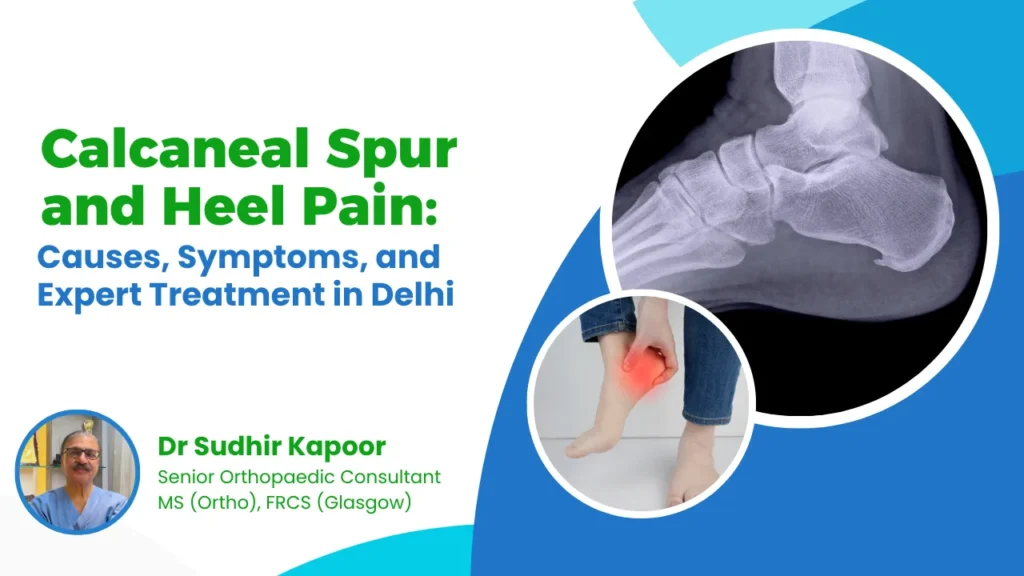Heel pain is a common issue that affects many individuals—particularly middle-aged adults, athletes, and people who are on their feet for long periods. One often overlooked but significant cause of persistent heel pain is a calcaneal spur. Though small in size, this bony outgrowth can cause serious discomfort and even affect your daily mobility.
What Is a Calcaneal Spur?
A calcaneal spur, commonly referred to as a heel spur, is a calcium deposit that forms a bony protrusion on the underside of the heel bone (calcaneus). This condition often develops over time due to repetitive stress on the foot’s muscles and ligaments. While it is frequently associated with plantar fasciitis, the two conditions can exist independently.
Calcaneal spurs may not always cause pain directly. However, when they irritate the surrounding soft tissues—especially the plantar fascia—they can lead to inflammation and chronic heel discomfort.
Common Symptoms of a Calcaneal Spur
If you are experiencing any of the following signs, a calcaneal spur may be the underlying cause:
- Sharp, stabbing heel pain, particularly during your first steps in the morning
- Persistent dull ache throughout the day
- Swelling or tenderness around the heel
- Pain that intensifies after physical activity, not during it
- A sensation similar to having a pebble stuck in your shoe
What Causes a Calcaneal Spur?
Several factors contribute to the development of heel spurs, including:
- Prolonged standing or walking, especially on hard surfaces
- Obesity or excessive body weight adding pressure to the heels
- Improper footwear that lacks arch support
- Participation in high-impact sports such as running or basketball
- Flat feet or abnormal walking posture
- Age-related degeneration of the soft tissues in the foot
When Should You See an Orthopaedic Doctor?
If your heel pain lasts for more than a few weeks and doesn’t improve with rest or over-the-counter treatments, it is time to see a specialist. Delaying diagnosis and care can lead to chronic inflammation, changes in your gait, and long-term pain.
An experienced orthopaedic doctor like Dr. Sudhir Kapoor can identify whether your heel pain is due to a calcaneal spur, plantar fasciitis, or another issue—and create a treatment plan customized to your needs.
Effective Treatment Options for Calcaneal Spur
Treatment depends on the severity of your symptoms. Common and effective approaches include:
1. Rest and Ice Therapy
Reduce inflammation by avoiding strenuous activities and applying ice packs.
2. Orthotic Insoles
Custom-designed shoe inserts provide arch support and reduce heel pressure.
3. Physical Therapy
Targeted exercises that stretch the Achilles tendon and plantar fascia can ease discomfort.
4. Anti-Inflammatory Medications
Non-steroidal anti-inflammatory drugs (NSAIDs) can temporarily relieve pain and inflammation.
5. Corticosteroid Injections
These are recommended in severe cases to manage pain by reducing inflammation quickly.
6. Shock Wave Therapy (ESWT)
This non-invasive technique stimulates healing in the affected soft tissues.
7. Surgery (Rare Cases)
If conservative treatments fail, surgical removal of the calcaneal spur may be considered.
Preventing Future Heel Spurs
To reduce your risk of developing calcaneal spurs or experiencing a recurrence, consider the following tips:
- Wear shoes that offer proper cushioning and arch support
- Maintain a healthy body weight
- Regularly stretch the calves and plantar fascia
- Avoid walking barefoot on hard surfaces
- Warm up properly before engaging in physical activities
Why Choose Dr. Sudhir Kapoor for Heel Pain Treatment in Delhi?
With over four decades of experience, Dr. Sudhir Kapoor is one of Delhi’s most trusted orthopaedic specialists. He has led prestigious institutions such as Lady Hardinge Medical College, ESI Hospital Basaidarapur, and the Indian Spinal Injury Centre. His in-depth expertise and patient-centric approach ensure that every treatment is both personalized and effective.
Conclusion
Heel pain, especially caused by conditions like calcaneal spurs, can significantly impact your daily life. Early diagnosis and proper treatment can prevent long-term complications. If you’re dealing with persistent heel pain, consult an orthopaedic expert like Dr. Sudhir Kapoor to regain your mobility and comfort.





